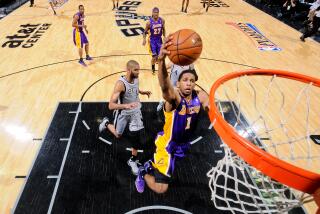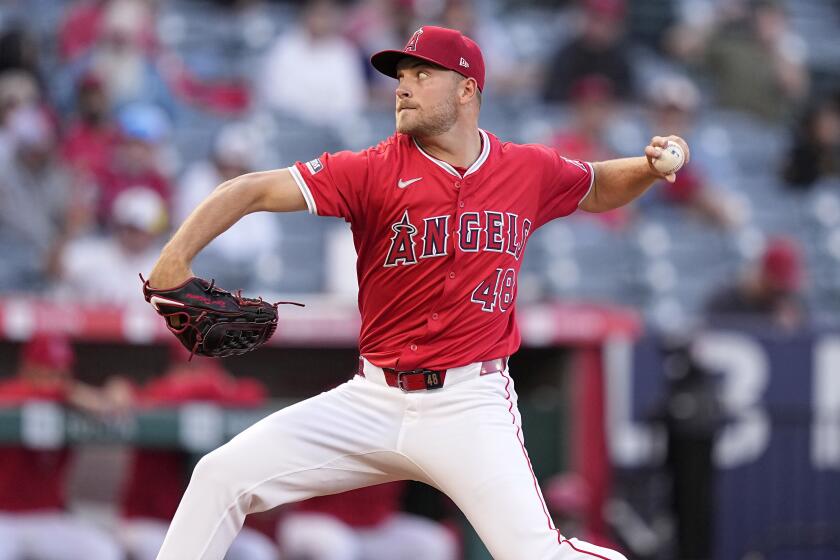BASEBALL : All-or-Nothing Reputation Is Still Stalking Deer
He is a walking encyclopedia of unusual statistics, a symbol of the Detroit Tigers, one of the most unusual pennant contenders ever.
“It’s just a blessing that we have a chance to win a division title,” right fielder Rob Deer was saying in Chicago the other night.
“If we were in last place I probably would have jumped off a bridge by now.”
Deer hit a three-run homer Wednesday night at Comiskey Park, ending an 0-for-19 drought, merely his latest. It was his 23rd homer of a season in which he has only 33 singles.
He is batting .176, and the statisticians have already determined that he will have hit more home runs and driven in more runs, 57, than any other sub-.200 hitter in history, if that’s where his average is at the end of the season.
He has struck out 153 times and might break his American League record of 186, set with the Milwaukee Brewers in 1987, but he has learned to ignore that part of his game.
Deer hit 28 homers and drove in 80 runs while compiling those 186 strikeouts, and he hit between 23 and 33 homers in each of his five seasons in Milwaukee while never striking out fewer than 147 times.
“I could take a bigger bat, choke up and put the ball in play, but I’m a free swinger,” he said in Chicago. “I don’t let the strikeouts bother me, as long as I’m not being totally careless.
“People have always wondered how many more homers I’d hit if I wasn’t striking out so much, but I can’t worry about that. I may strike out three straight times and hit a game-winning homer in the ninth. I’ve learned to live with that and accept it.”
A 30-year-old graduate of Anaheim’s Canyon High, Deer is more concerned about a continuing slide in his batting average.
He has gone from a career high .252 in 1988 to .210 in ‘89, .209 in ’90 and now this history-tinged low in the first year of a three-year, $6-million-plus free-agent contract with the Tigers.
“I know I’m not going to hit .300, but I know I can be respectable,” he said. “I know I’m not a .175 hitter, but I can’t seem to get over the hump.
“I’ve been in a slump since the first week of the season, and I think I may have paid too much attention to it and thought too much about it too early.
“Now I’m just trying to do something to help us win each day, whether it’s with the bat, the glove or breaking up a double play. I’ve hit 12 homers in a month before, and I still have time.”
It’s not as if his summer has been a total waste. He has walked 77 times and of his 23 homers, 19 have been hit with the difference in the score three runs or fewer.
“The frustrating part is that the people in Detroit see me struggle and probably think that’s all I can do, when I know I can do more,” Deer said.
“I mean, I’m in a situation I’ve always wanted to be in, a pennant race with a great group of guys, and it’s frustrating not to have done some of the things I’ve done in the past. But we have a chance to win and that would outweigh all the negatives.
“If I have a ring at the end of the season, I know I’ll have had something to do with it.”
THOSE TIGERS
Deer’s statistics reflect those of his improbable team.
As Manager Sparky Anderson said after a three-game sweep of the White Sox on Wednesday night: “We do it in funny ways, but the name of the game is do it, period.”
There are the Tigers, tied with the Toronto Blue Jays for the lead in the American League East, despite the league’s lowest team batting average and highest earned-run average.
And there are the Tigers, 33-20 since June 28 and 26-17 since the All-Star break, despite the league’s lowest strikeout total by the pitchers and highest by the hitters, who were, as Anderson had predicted in the spring, “air conditioning a few ballparks” while closing in on the major league record for strikeouts by a team.
“Our guys swing and miss a lot, but they can also hurt you in a hurry,” pitcher Frank Tanana said. “We’re a mashing type team. We put up touchdowns at a time.
“Check the size of our guys and you’d almost think you were in a football clubhouse.”
Led by Fridge II, Cecil Fielder, the Tigers have six players with 15 or more home runs and a wide lead in that category while running a close second to the Texas Rangers in runs. Detroit averaged almost six runs a game during that 33-20 stretch to overcome an average yield of more than five.
On the basis of pitching--what the West boasts and the East lacks--Anderson thinks Detroit would probably finish sixth in the West and Toronto fourth.
He has come to self-deprecating grips with a staff that has only two pitchers--Tanana and Bill Gullickson--with 10 or more victories.
Asked if he considers Gullickson, signed as a fringe free agent and now the staff ace with 16 victories, to be a godsend, Anderson said, “We look on anybody who can win for us to be a godsend.”
He added: “Everyone talks about balance and that’s what we have. We’ve scored about 630 runs (actually 648) and given up about 630 (632).”
But the Tigers, who open a West Coast swing Monday night in Anaheim, continue to do it in their funny and mashing ways, and Anderson said Wednesday that they needed to win 25 of their last 40 for a total of 92 to have a chance.
They need pitching, even if it’s only a little.
“How this team is where it is, with the pitching we have, I don’t think I’ll ever know,” he said. “But as long as I don’t find out before Oct. 6, then we’ve got a chance.
“I mean, everything from here on out is a bonus. It’s like we’re gambling with the house’s money. If we can get a little pitching now--I mean, just a little--we can make everyone take back what they’ve said about us all year.
“Including me.”
FRESH TRACKS
All those strikeouts and home runs have obscured a significant development for the Tiger future.
A farm system that had failed to produce one position player since Howard Johnson in 1984 has suddenly produced two--rookie center fielder Milt Cuyler, who has stolen 31 bases; and second-year third baseman-shortstop Travis Fryman, who has 16 home runs and 68 RBIs.
The remarkable thing about their arrival is that it has been devoid of the usual hype, those Hall of Fame comparisons by Anderson.
“I love to build ‘em up and had fun doing it,” Anderson said of his previous pattern. “But I also realize I may have hurt some of them, put too much pressure on them by doing it.
“Both of these kids need one more year, but as good as I think they’re going to be, and as much as I want to do it, you’re not going to hear me rave about them.”
Part of that decision stems from a belief that before his 1989 hiatus for physical and mental exhaustion, he was too wrapped up in his own ego, too likely to make himself the centerpiece of too many things.
“I made a fool of myself,” Anderson said. “The last two years have been my best and happiest as a manager.”
METS’ MORASS
The disintegration of the New York Mets, watched without response by the front office, has enveloped starters Frank Viola, 1-6 in his last seven starts; and David Cone, 1-5 in his last seven.
Said Cone: “Early in my career, the knock on me was (that) I pitched the way the team played. I thought I put that behind me, but right now I’m very frustrated with the way the team is playing.”
The Mets are further back than at any time since they ended the 1983 season 22 1/2 games out.
But disputing what seems to be the widespread feeling among his teammates, Dwight Gooden says the situation can be reversed quickly.
“From my relationship with Fred Wilpon (the Mets’ co-owner), I’m sure we’ll be OK,” Gooden said. “I don’t think Fred will ever let it get ugly here, not like it was before ’84.
“I’m not sure about what has to be done. That’s their responsibility upstairs. I’m not sure why it all fell apart. Bad mix of people? Bad play? How do you fix that?
“There are some things I’d like to see us do--re-sign V (Viola), go after (potential free agent) Bobby Bonilla and, maybe, if they trade Ellie (Kevin Elster), we should try and go after Shawon Dunston (another potential free agent).
“There’s a lot we can do. And I think we will. I’m predicting a turnaround, even if we don’t make changes.”
REBOUNDING
Rick Sutcliffe, so discouraged by the prolonged problems with his shoulder and a series of ineffective starts during a minor league rehabilitation assignment that he was talking about retirement a few weeks ago, has won his last three starts for the Chicago Cubs, giving up three earned runs in 21 innings, with 17 strikeouts on sliders and fastballs.
Sutcliffe credits Billy Connors, who recently replaced Dick Pole as the Cubs’ pitching coach, for making adjustments in his delivery.
“I’m doing some things different,” he said. “Nothing illegal, but it would be a mistake if I told the league what it is.”
The Cubs hope to avoid a mistake with Sutcliffe, who has averaged $1 million per victory, of which he has four, over the last two years. At 35 and a free agent when the season ends, he seemed destined to leave with only a warm handshake from the Cubs, but now?
“I don’t know what to say about him,” General Manager Jim Frey said. “I think the only thing that anyone can say is that we have six weeks to see what consistency he has. That’s all we can do.”
CHANGES
--Buck Rodgers is telling friends that he expects to manage next year with either the Angels or Milwaukee Brewers, who are expected to move Harry Dalton out of a position of authority and replace him as general manager with Sal Bando and super-scout Al Goldis.
--The word among scouts is that the Angels intend to fire scouting director Bob Fontaine Jr. and replace him with Jeff Scott of the Oakland Athletics.
--Texas Ranger owner George W. Bush Jr. gave a vote of confidence to General Manager Tom Grieve and Manager Bobby Valentine the other day, but innovative pitching coach Tom House apparently will be made a scapegoat for a series of injuries to key pitchers and the team’s second-half slide. The Rangers recently ordered pitchers to stop throwing footballs before games, which House had recommended as a way of loosening up.
--Bob Quinn’s stand-pat policy is likely to cost him his job as general manager of the Cincinnati Reds. The contract extension Quinn received early this season is only a multimonth arrangement protecting him through March. Marge Schott, the Reds’ owner, is selling Quinn’s six-seat executive box at Riverfront Stadium for $200 a game.
More to Read
Get our high school sports newsletter
Prep Rally is devoted to the SoCal high school sports experience, bringing you scores, stories and a behind-the-scenes look at what makes prep sports so popular.
You may occasionally receive promotional content from the Los Angeles Times.






